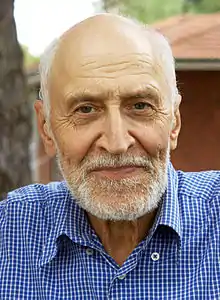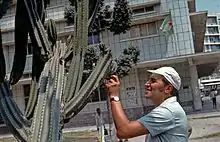Nikolay Drozdov
Nikolay Nikolaievich Drozdov (Russian: Николай Николаевич Дроздов; born 20 June 1937) is a Russian doctor of biological sciences, candidate of geographical sciences, zoological sciences, professor of Moscow State University, a public figure, member of the expert council of the national award "Crystal Compass," a member of the media council of the Russian Geographical Society.
Nikolay Drozdov | |
|---|---|
 Nikolay Drozdov in 2011 | |
| Born | 20 June 1937 |
| Nationality | Russian |
| Alma mater | |
| Occupation |
|
| Title | |
| Spouse(s) | Tanya Petrovna |
| Children |
|
| Awards | |
Drozdov has worked on the Russian show In the World of Animals for over 30 years beginning in 1968. He served as a commentator, and then in 1977 became a writer on the show and an anchor. He is a recipient of The Golden Orpheus TV award. In the World of Animals won the TEFI award as the best popular scientific program in 1995. Drozdov was elected to the Russian TV Academy in 1996. Drozdov is a recipient of the Kalinga Prize as well as the UNESCO Albert Einstein medal (gold). He has written 20 books and numerous articles, and is an ecology adviser to the UN Secretary General.[1]
Biography
Nikolay Nikolaevich was born in Moscow, into a family of scientists. His father, Nikolay Sergeevich Drozdov (1902—1963), was Professor of Organic Chemistry at the 2nd Moscow State Medical Institute. His mother, Nadezhda Pavlovna Dreyling (1906—1993), was a physician at the 5th city hospital in Moscow and was assistant to academician P. E. Lukomskiy . The great-grandfather on the mother's side is Ivan Romanovich von Dreyling, [2] from an old Tyrolean and then, a Russian noble family. He was a cuirassier officer, at the age of 17 he participated in the Battle of Borodino, was an orderly of the Field Marshal Mikhail Kutuzov, and then, went to Paris and participated in the battles, was awarded the Order of St. Anna of II degree and St. Vladimir of IV degree with a bow, kept a detailed diary of combat actions, stored in manuscript in the Historical Museum and published in the book “1812. Memories of the soldiers of the Russian army. While studying at school, he worked as a herdsman at the stud farm in the Rybnovsky District of the Ryazan region. After school, he entered the Faculty of Biology of the Moscow State University,[3] where he became a friend of Vladimir Pozner. After leaving the second year of biology of the Moscow State University, he worked at a garment factory,[3] first as a student, and then went to the master of the seventh category for sewing men's outerwear.[2]
In 1952–1955, he actively participated in the work of the biology club of All-Russian Society for the Protection of Nature (VOOP) under the leadership of P. P. Smolin. Together with Boris Vilenkin, Pyotr Vtorov, Yuri Puzachenko, Olga Shokhina, Mikhail Chernyakhovsky, Leonid Lisovenko and Roman Zlotin, they became prominent representatives of the second generation of VOOP.[4] In 1956-1957, he studied at the Faculty of Science of the Moscow City Pedagogical Institute of V.P. Potemkin. After the second year, he moved to the MSU Faculty of Geography. In 1963, he graduated from the Department of Biogeography of the Faculty of Geography of Moscow State University, and by 1966 pursued his prost-graduation education.
Scientific and social work

In 1968, he defended his postgraduation education thesis on the topic "Cultural landscapes of the arid regions of the USSR and their avifauna". Since then, he is working at the Department of Biogeography of the MSU Faculty of Geography - first junior, then senior research associate, since 1979 - associate professor, and since 2017 as professor.[5] He has read courses in ecology, ornithology, nature conservation, world biogeography; he constantly gives lectures.
In 1968, for the first time he appeared in the popular television show “In the world of animals”.A. G. Bannikov[6] introduced him to the show host, A. M. Zguridi. Later he was a scientific consultant of the movies about animals “Black Mountain”, “Riki-Tiki-Tavi”, etc. Since 1977, he became the host of this program.
In 1971-1972, he passed a 10-month scientific internship at the Faculty of Zoology of the Australian National University (Canberra, Australia). Traveled to many areas of Australia and described this journey in the book "Flight of the boomerang."
In 1975, he worked as part of the Soviet delegation at the XII General Assembly of the International Union for Conservation of Nature in the city of Kinshasa (Zaire). Elected member of the IUCN National park Commission. Visited the eastern part of Zaire and the national parks of Virunga and Kahuzi-Biega. For the first time, a group of USSR zoologists saw mountain or Eastern gorilla in the natural environment. The photos and trip report were published in the Природа Nature magazine.[7][8] In the same 1975, after visiting India, Drozdov became a vegetarian.[9]
He participated in numerous scientific expeditions on the territory of the USSR (to Kamchatka Peninsula, the Far East, the Kuril Islands, the Pamir Mountains, the Tian Shan, the Karakum Desert).[10] In 1979, he climbed to the top of Mount Elbrus. In 1980, he participated in a 4-month expedition on the research ship of the Academy of Sciences of the Soviet Union Callisto on the islands of Fiji, Tonga and Samoa, within the framework of the national project "Ecosystem" of the Academy of Sciences of the Soviet Union, on the topic "Protection and rational use of island ecosystems." In 1993 and 1995, he participated in the expeditions of the Russian icebreaker Yamal (to the North Pole and on the Northern Sea Route) and on the ship "Discoverer" (along the coast of Alaska and Canada). Since 1996, he was a member of the High Advisory Council on Sustainable Development under the United Nations Secretary-General.[10] In 2002, as part of the International Expedition, made a landing on the North Pole and spent a week in the ice camp Barneo. In the same year, a member of the expert council of the national award "Crystal Compass". In 2000, in Petrozavodsk city, he defended his PhD thesis in Biological Sciences (having no dissertation text, based on several works) on the topic “Fauna, animal population and protection of biological diversity in arid regions of the Earth”.[11] In 2014, he was elected to the Civic Chamber of the Russian Federation of the 5th legislature (by 2017).[12] He is a member of Public Council of the International Public Movement "We love Russia".[13]
Social position
In 2010, he supported a protest against deforestation of protected forest in the Khimki Forest.[14]
In 2012, he supported organizations and individuals promoting nature conservation.[15]
He maintained close contacts with the (Patrciarch of Moscow) the head of the Russian Orthodox Church.[16]
In 2014, he advocated for the animals defense and for preservation of their habitat. For many years, he fruitfully cooperates with the national and international environmental organizations.[17][18]
Approved the Annexation of Crimea by the Russian Federation.[17][19]
Broadcasting Jobs
In 1977—2019 - the host of the TV program "In the world of animals".
In 1996, he was elected the member of the Academy of Russian Television. In the same year, the program “In the animal world” was awarded the “TEFI” award as the “Best Educational Program”.[20] Author and co-author of many documentaries and videos about nature and animals: the series “By the pages of the Red Book”, “Rare animals”, “Standards of the biosphere” (ordered by UNESCO) and the others.
In the early and mid-2000s, he translated and voiced BBC documentaries the “Wildlife”. The largest work is the 6-episode documentary Realms of the ”Russian Bear” (1988–1992), developed jointly with the natural history department of the BBC.
He was repeatedly a member of the jury of the Pop scientific film and television festivals about animals and the nature of Great Britain and Italy.
In 2003 and 2004, he took part in the reality show “Last Hero” (fourth and fifth editions).[21] Participated in the special edition of the What? Where? When? ” program dated April 1, 2005 (on the 10th anniversary of the first broadcast at the Channel One Russia ) as part of the team of hosts of those years,[22] as well as in the KVN (in the second semi-final of the Higher League, in the fall of 2014).[23]
In 2005, she starred together with Nikas Safronov in the reality TV show “Rublevka. Live » (NTV)).[24]
In 2008, he was the host of the program “In the world of people” at the Channel One Russia, but it did not last long, but caused a lot of negative emotions and criticism.[25][26]
In 2014, he led the program “The Alphabet of the Forest” on the “Children's Radio”, in which he read N. Sladkov's stories about nature.[27]
References
- "Channel One Russia". Retrieved 6 June 2012.
- Труд, 29.11.2007.
- Познер, Владимир. (2014). Прощание с иллюзиями. Москва: АСТ. p. 150. ISBN 9785170773282. OCLC 825071038.
- Пузаченко Ю. Г.«Жизнь моя, иль ты приснилась мне……» Среда, ППС и я (1952—1962 гг.) // Потому что я их люблю (ППС и ВООП) М.: Тип. Россельхозакадемии, 2008. С. 106—130.
- "К юбилею Николая Николаевича Дроздова". МГУ им. М.В. Ломоносова. 2017-06-20.
- Пивоварова Е. П.Воспоминания Банникова Андрея Григорьевича Современные проблемы зоологии, экологии и охраны природы // Материалы чтений и науч. конф., посвящ. памяти проф. Андрея Григорьевича Банникова, и 100-летию со дня его рождения. Москва — 24 апреля 2015 г. — М,: Сельскохозяйственные технологии, 2015. С. 43-45.
- Банников А. Г, Второв П. П., Дроздов Н. Н. В национальном парке Вирунга // Природа. 1976. № 8. C. 108—120.
- Второв П. П., Дроздов Н. Н. Кахузи-Бьега — обитель гориллы // Природа. 1976. № 10. C. 112—123.
- "Николай Дроздов: "Я знаю 7 овощей, продлевающих молодость"". Собеседник. 2017-06-20.
- Australian art Archived 19 August 2016 at the Wayback Machine, Art Gallery of New South Wales. Retrieved 27 August 2014.
- Дроздов Н. Н. Фауна, животное население и охрана биологического разнообразия в аридных регионах Земли. Автореферат диссертации на присвоение учёной степени доктор биологических наук в форме научного доклада. Петрозаводск. Спец. ВАК: 03.00.08 Зоология. 57 с.
- Николай Дроздов и Константин Райкин вошли в новый состав Общественной палаты. ТАСС, 31 мая 2014 г.
- "Общественный совет". Archived from the original on 2018-04-27. Retrieved 2019-06-25.
- "Николай Дроздов, Артемий Троицкий, Юрий Шевчук. За Утриш, За Байкал, За Химкинский лес (Видео)". За Краснодар!. 2010-10-20.
- Радио Свобода, Час прессы: Дроздов голосует за Путина, потому что тот спасает тигров, 23 февраля 2012.
- Земскова Н. (2013-07-24). "Николай Дроздов: через созерцание природы к познанию Бога". «Православный Симбирск», № 14 (358). pravoslavie.ru. Retrieved 2014-12-22.
- Дроздов Н. Н. (2014). "Обращение к Президенту РФ В.В. Путину во время встречи с членами Общественной палаты". terra-viva.ru. Retrieved 2014-12-22.
- "20 000 деревьев высажено в Жулебинском парке". skyleaftv.com. 2014. Retrieved 2014-12-22.
- "Правление СП России — Федеральному собранию РФ, Президенту РФ В. В. Путину". rospisatel.ru. 2014-03-06. Retrieved 2014-12-22.
- "Победители конкурса "ТЭФИ-1996"". Академия российского телевидения. Archived from the original on 2012-06-24. Retrieved 2012-06-23.
- Неохотничьи рассказы: Николай Дроздов и его животные — Персона — Культура — Аргументы и Факты
- "Владимир Меньшов назначен капитаном. Ведущие Первого канала будут знатоками". Комсомольская правда. 2005-03-24.
- "Как создаются СТЭМы, или "Я там ещё шуток поднакидал, приеду – расскажу"". Клуб весёлых и находчивых. 2014-10-17.
- "НТВ ВНЕДРЯЕТСЯ В ЖИЗНЬ РУБЛЕВКИ". InterMedia. 2005-10-18.
- Как остаться Дроздовым «В мире людей?»
- "Про уродов и людей - Новости Санкт-Петербурга - Фонтанка.Ру". Archived from the original on 2013-04-03. Retrieved 2013-03-29.
- "Азбука леса". 2014. Archived from the original on 2014-08-25. Retrieved 2014-08-25.
Рассказы детского писателя-натуралиста Николая Сладкова, из которых состоит «Азбука леса», в исполнении известного знатока природы Николая Дроздова можно услышать только на Детском радио.
External links
| Wikimedia Commons has media related to Nikolay Drozdov. |
- World of Animals TV show with Nikolay Drozdov.
- Nikolay Drozdov on History of Russia in Photographs site.